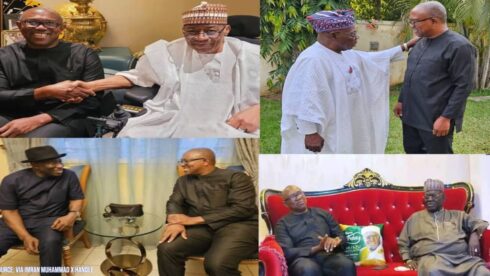Peter Obi, the former Governor of Anambra State and Labour Party’s 2023 presidential candidate, has initiated high-profile visits to some of Nigeria’s most respected political leaders. These visits have sparked widespread interest as Peter Obi, a leader renowned for his policy-driven approach, seeks counsel from former heads of state and influential figures such as Ibrahim Babangida, Goodluck Jonathan, Olusegun Obasanjo, and Babangida Aliyu. The meetings are perceived as a calculated effort to address national challenges and foster unity across Nigeria’s diverse regions.
The backdrop of these consultations is Nigeria’s ongoing socio-economic and political turmoil, including heightened insecurity and economic instability. Peter Obi’s engagement with these statesmen reflects his commitment to inclusive governance and collaborative solutions. By drawing from their vast experiences, he aims to develop a framework for addressing Nigeria’s pressing issues, strengthening democracy, and uniting the nation under a shared vision of progress and stability.
Engaging with Ibrahim Badamasi Babangida: A Symbol of Reconciliation
Peter Obi’s first stop was in Minna, Niger State, where he met with former military president Ibrahim Badamasi Babangida (IBB). Known as one of Nigeria’s most influential elder statesmen, Babangida’s tenure remains a cornerstone in the nation’s political history. Peter Obi’s visit to IBB is viewed as a deliberate effort to bridge generational gaps in leadership and promote reconciliation across political divides.
During their meeting, discussions reportedly centered around Nigeria’s economic challenges and strategies for fostering national cohesion. Babangida commended Peter Obi’s commitment to the nation’s progress, highlighting the importance of involving younger leaders in shaping Nigeria’s future.
Goodluck Jonathan: Strengthening Democratic Values
Peter Obi also paid a courtesy visit to former President Goodluck Jonathan at his Abuja residence. Jonathan, who is widely respected for his statesmanship and peaceful transition of power in 2015, shared insights into the challenges of leading a diverse nation.
The duo discussed Nigeria’s democratic evolution, emphasizing the need for credible elections and sustained political reforms. Peter Obi lauded Jonathan for his role in preserving democracy and assured him of his commitment to inclusive leadership that prioritizes the needs of ordinary Nigerians.
Dialogue with Olusegun Obasanjo: The Mentor-Apprentice Dynamic
Former President Olusegun Obasanjo, known for his profound influence on Nigerian politics, also hosted Peter Obi at his Abeokuta residence. The meeting reinforced the mentor-apprentice dynamic between the two leaders, as Peter Obi has often credited Obasanjo for inspiring his leadership style.
Obasanjo, a staunch advocate for good governance, urged Peter Obi to remain steadfast in his mission to transform Nigeria. The discussions touched on youth empowerment, agricultural development, and fostering a robust economy to alleviate poverty.
Meeting Babangida Aliyu: Building Bridges Across Political Lines
Peter Obi rounded off his visits with a meeting with former Niger State Governor, Babangida Aliyu. Known for his extensive political network and influence in Northern Nigeria, Aliyu represents a key figure in building regional partnerships.
The discussions reportedly revolved around national security, education, and the need for cross-regional collaboration to address Nigeria’s pressing challenges. Peter Obi’s engagement with Aliyu underscores his commitment to bridging the North-South divide, a critical aspect of fostering unity in a diverse country like Nigeria.
National Implications of Peter Obi’s Consultations
The series of meetings highlights Obi’s determination to align his vision with the collective wisdom of Nigeria’s elder statesmen. These consultations come at a time when the nation is grappling with economic downturns, security concerns, and calls for political reform.
Observers note that Obi’s proactive approach could pave the way for a more collaborative governance model, emphasizing dialogue over division. As Nigeria looks to the future, the insights gained from these leaders could serve as a blueprint for addressing the country’s myriad challenges.
Table of Contents
Discover more from OGM News NG
Subscribe to get the latest posts sent to your email.














